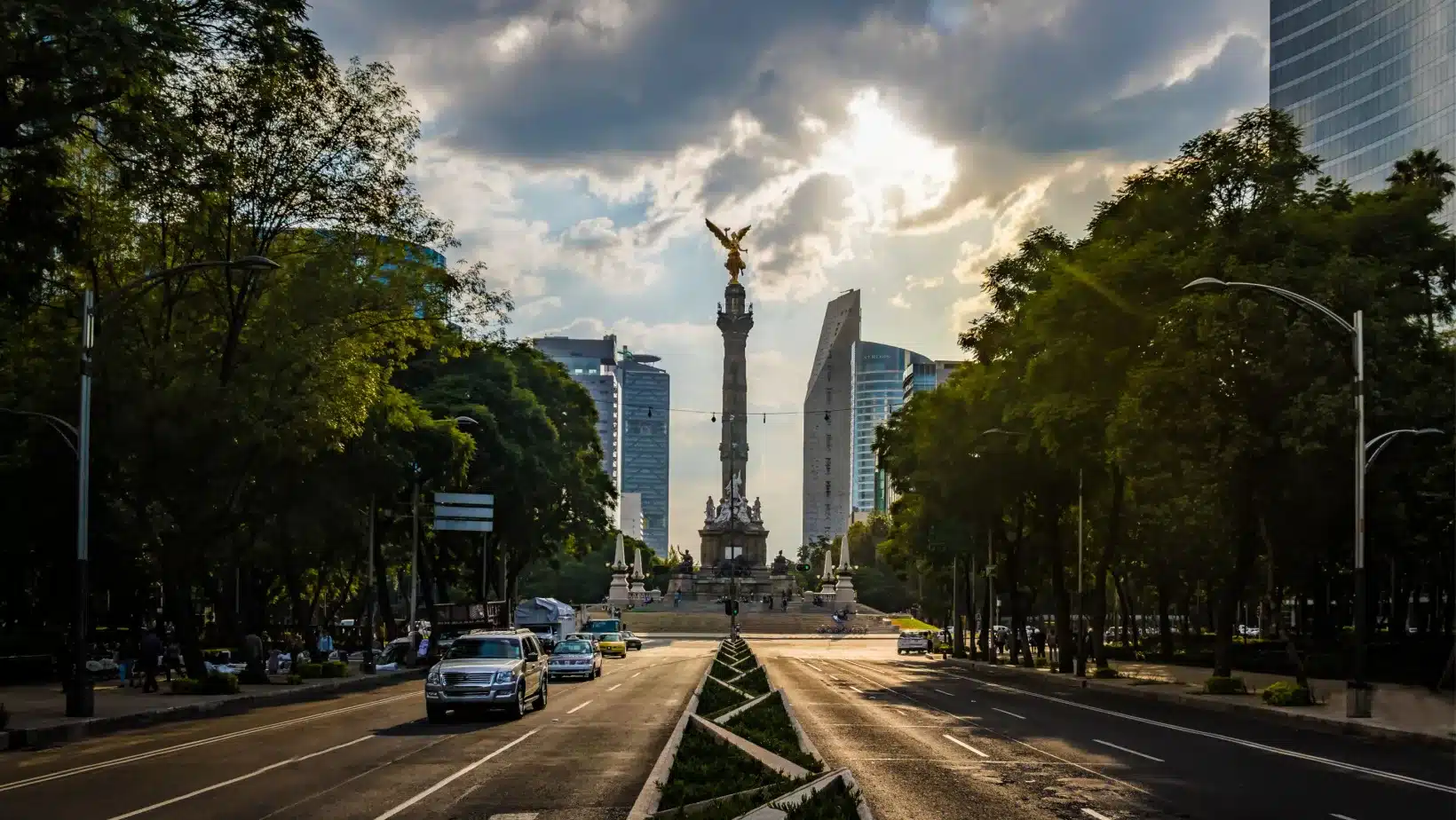You may have seen this story over the weekend. Hundreds of demonstrators protested in Mexico City against foreigners, and the headlines are scary. They vandalized buildings and attacked people.
When things like this happen, or protesters squirt tourists with water guns in Barcelona, people often turn to me for simple answers. Unfortunately, simple answers are what lead to behaviors like squirting strangers with water guns. To understand this fully, we have to go deeper—into history, economics, fear, and the emotional power of uncertainty.
Let’s start with where we are.
Fear Loves a Headline
In a city of 25 million people, a few hundred gathered to protest. But the photos and soundbites traveled around the globe in hours. That’s because we’re living in a moment where fear is currency. Headlines like “Mexicans rise up against foreigners” provoke, polarize, and generate clicks. It doesn’t matter if 99.9992% of the people in Mexico City were going about their day; the camera was focused on the chaos.
This is not a uniquely Mexican problem. In fact, it mirrors what we see in the United States and across Europe: tension, division, and a scramble to assign blame. It’s no accident. Many of the systems people are struggling with, like rising housing prices, wage stagnation, and frayed social safety nets, have complex roots. But when people are scared and uncertain, complexity doesn’t sell. Simplicity does. And nothing is simpler than pointing to “the other” and saying: it’s their fault.
In the articles about Mexico City, they often say foreigners live in neighborhoods with coffee shops or yoga studios. What’s the picture they’re trying to paint? Do you think that Mexicans don’t go to coffee shops or do yoga? Are they playing into stereotypes in your head? In the articles about Portugal, they say that the foreigners are drinking wine or wearing yoga pants. What are they trying to convey, that somehow Mexicans or Portuguese are less cultured? Less shallow? Are they trying to turn you, the reader, against a certain American stereotype?
In real life, most of us are more alike than different. We wear clothes and consume food & drink and smile at each other and interact. We want to have happy lives and healthy families and purpose. We’re not soap opera rivals or reality show villains.
“Speak the Language!” Sound Familiar?
In the US, we recognize the cruelty in phrases like “This is America, speak English!” So why do some people excuse the same demand in reverse? When protesters in Condesa yell “speak Spanish or go home,” it hits differently to some ears because it feels like a response to injustice. But it’s the same emotional weapon.
It doesn’t become virtuous just because the target is richer or whiter. If it sounds ugly in English, it’s still ugly in Spanish. It’s still xenophobia, and it’s a way of externalizing your problems instead of adapting to them.
I don’t fault people for blaming others. They’re mostly being manipulated by others to get them to vote, click, or buy something. I always believe that people are doing the best they can with what they have.
Outrage is incredibly motivating—in fact, it’s why this story is even being covered—but it’s also so, so addictive. People from any side of the political spectrum pointing fingers and looking for scapegoats is essentially what’s tearing the world apart, but I assure you the problem (at least today) is not as extreme as it is in the United States.
That doesn’t mean things can’t change—that someone can’t weaponize outrage the way they have in the US—but there are many more safeguards in place in other countries, like social supports or government regulation.
The Pandemic Changed Everything
Rents didn’t rise because Americans moved to Mexico. They rose because, during the pandemic, landlords and investors chose to raise prices.
Nonetheless, young people were stuck inside, isolated and online, some of them consuming content that villainized outsiders. They watched their job prospects dim and their rents go up, and while corporations and governments made many of those decisions, the villains in the videos were often people they could see: tourists, foreigners, remote workers with laptops and lattes.
Even blaming Airbnb is too simple. During the pandemic, current Mexican president Claudia Sheinbaum was the mayor of Mexico City. She’s a democratic socialist with a PhD in energy engineering, and she knows a lot about sustainability. Her party voted to raise minimum wage by double digit percentage increases each year for the past 6 years. She chose to work with Airbnb, because the economic benefits to her constituents outweighed the costs. Countries only offer nomad and retiree visas if the economic benefits outweigh the negatives.
It stings to be treated as if you caused Airbnb inflation when you have no control over municipal zoning. That’s the same sting felt by Mexican farmworkers blamed for wage stagnation in Iowa.
If Data Says Immigrants Add More Than They Take, Why Does the Myth Live On?
The answer is emotional, not statistical. People are scared. They’re afraid of losing culture, of losing homes, of being pushed out. That fear is real, but it gets weaponized. It becomes a blunt instrument, used to push headlines and shape policy. Politicians, media outlets, and even local landlords profit when neighbors are too busy blaming outsiders to notice stagnant wages or runaway rents.
The same thing happened in the US, where resentment toward immigrants surged in small towns. It wasn’t the billionaires who were blamed for offshoring jobs—it was the family that moved in and spoke Spanish at the grocery store.
This is how prejudice works. It builds when people feel powerless, and it targets whoever seems easiest to punch. It’s difficult to be the one being punched, and it’s important to empathize with the person protesting and understand where they’re coming from. That doesn’t mean you can’t move abroad or that you have to stay in an unsafe situation yourself, it just means you need to listen and see how you can help.
On Being a “Good” Immigrant
If you’re reading this, I know you want to be a good immigrant. When you move to another country, you will take up space. If you rent an apartment in Mérida, you will indeed occupy a home—but you also leave one behind in Milwaukee. Housing churns; it’s not a sacred artifact.
If all 50 million immigrants in the US created a new country, it would have a larger population than 85% of nations. You migrating to make space for someone from another country in the US is just as impactful as taking a space from them abroad.
Still, the question remains: how do you become a good immigrant? Pay your taxes, learn the language, and shop local. Follow local customs and try to be ordinary, not a main character. Don’t go into another country trying to make it America. Let it change you.
A good rule of thumb? The only difference between “expats” and other categories of immigrants is the privilege of choice. Use yours to grow. Learn to live without a clothes dryer. Eat meals at different times. Get used to slower service. Respect noise laws (or lack thereof). Don’t become a landlord unless you’re adding to the housing market. And above all, don’t center yourself in every story.
People often ask me for the perfect country that’s clamoring for Americans. Wouldn’t that be nice? But how would that work? Which Americans? Why Americans? What does that even mean? Countries need one of two things: money or labor. Sometimes they need both. But they’ll never care that you’re American, one way or another, and to think so is an indication that you might still believe in American exceptionalism. I understand: you don’t feel safe at home, and now you don’t feel safe abroad, either.
I also think it’s important to realize that being a good person is so noble, but hoping strangers will recognize you as a good person is probably not practical. I think this is also an opportunity to work on any white fragility. Yes, some strangers may dislike you for being a white American. Sit with the discomfort instead of demanding a red-carpet welcome. Black and brown migrants endure far worse every day and get back up. Learn from that humility.
Am I a Colonizer?
Imagine if Christopher Columbus had landed in Haiti and settled down. What if he’d learned the local language? Bought a nice house? Shopped at the market? Threw dinner parties? Helped build things? Would the word colonize even exist?
Colonization is about taking land, power, and resources from a place and using them to enrich your homeland. It’s about domination. Expats do the exact opposite: they spend their foreign money and have no political power. They can’t even vote. Maybe a coffee shop springs up to serve them, but that’s a far cry from rape and murder.
Gentrification happens everywhere, but the villain isn’t the foreigner paying market rent. Maybe it’s the system that allows short-term rentals and speculation to outbid long-term tenants, or maybe it’s a natural cycle that will always happen as long as there’s income inequality in the world. Either way, you are allowed to live a thoughtful, considerate life anywhere laws allow for it.
Deconstruct the Myth
When I was growing up, I believed that the best thing you could be was skinny (I wasn’t), and that being fat was somehow bad. The message was everywhere.
With the advent of the internet, I started seeing counter arguments that being fat was better and skinny women were bad. This was a very tempting message! It would have been nice to be on top for once. But I sensed that wasn’t right, either.
Finally, I learned that being fat and skinny were equal, morally neutral states. The real villains were the diet industry and others who profited from women fighting or feeling bad about our bodies.
A similar narrative is happening here.
What if instead of fighting each other, we joined hands and fought upward at those who’d seek to divide us?
Blame is Cheap. Change is Hard.
None of this is to excuse bad behavior. If you move abroad and act like a jerk—if you condescend to locals, ignore customs, or try to “fix” everything to feel like home—you should expect some pushback. That’s not xenophobia. That’s justice.
But you also don’t have to feel guilty for simply existing. Most of us are seeking peace.
Billionaires are the ones buying up land. Corporations are lobbying against rent control. Politicians are dodging real reform. And here we are arguing over who speaks what language at the coffee shop.
We can do better.
Final Thought
If you need every country to roll out the red carpet for you, you may not be self-aware yet enough to move abroad. Living in another culture requires humility. It requires listening. It requires discomfort.
Most important, it requires being present, not scrolling online for other people’s opinions of who you’re supposed to love or hate. In real life, you will make human connections that go far, far deeper than protest signs.
Look for other stories, ones of human connection, of lifting each other up.
Just don’t let fear—yours or anyone else’s—write the story for you.







